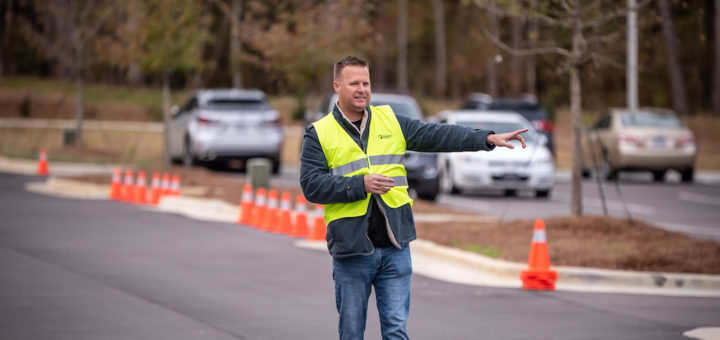Plumb Lines in a Pandemic, part 1

As church leaders begin to re-engage with in-person weekend services, I thought it might be fitting to revisit our Plumb Lines series, specifically applying those steady principles to our current uncertainty.
A plumb line is a construction tool used to determine whether or not something is perfectly upright. In our context, a plumb line is a short, sticky phrase intended to keep us aligned with our guest services values.
The gospel is offensive. Nothing else should be.
Our first plumb line serves as the north star, the big kahuna, and the driving force behind all the rest. 1 Corinthians 1:18 reminds us that the word of the cross is foolishness to those who are perishing, but to those of us being saved it is the power of God.
Pre-COVID, that plumb line meant that we preach the gospel in all its power. We prioritize the gospel above all. We don’t apologize for the offense of the gospel, because the Holy Spirit is able to make dead hearts alive.
However, the second part of the plumb line means that while the gospel is offensive, the road to the gospel should be paved with rose petals and puppy fur. Our signage, our systems, our sayings…all of that and more should draw people in rather than box them out.
How does this apply as we re-gather?
Plumb line #1 reminds us to eliminate all distractions so the gospel remains preeminent. And if we know anything about this season, it’s that distractions abound: unclear or constantly-changing timelines. Required face masks and social distancing. Lingering fears about venue safety, cleanliness protocols, and virus exposure. And underlying all of that are people who are on vastly different ends of the spectrum when it comes to agreeing on the best way forward.
There are at least three ways to minimize distractions and offenses as we re-gather:
1. Modify expectations.
In your communication, detail exactly what you’re doing and what will be required. If your in-person gathering will be different than what your people are used to, say it. If masks are going to be required, specify that. The more you can prepare people for the unknown, the more you cushion their re-entry into the new reality.
2. Show your work.
If you have implemented new cleaning protocols, detail what those are through email, videos, or signage around the campus. If your new regulations are based on state requirements or local mandates, lean on that. Let guests actually see staff and volunteers wiping down surfaces, holding doors open, and doing everything necessary to keep the germs at bay. This posture will help two groups of people: those who believe COVID is overblown will (hopefully) respect your submission to governmental authority, and those who are fearful to return will (hopefully) be charitable to you as they see the effort you’re making to keep the community safe.
3. Follow the rules, but display grace.
New policies mean nothing if you toss them out the window at the first sign of conflict. So yes, follow the rules you’ve put in place. But at every step, in every moment, with every person, show grace. Shepherd the sheep who are willingly following you, and shepherd those threatening to bite you. In most cases, people are opposing the policy or embracing their preferences more than vilifying you. So listen. Smile. Pray. Don’t take it personally and maybe even agree to disagree. But in the end, see them as a person to be loved rather than a problem to be managed.
4. Point them (and yourself) to something greater.
Romans 8 and 2 Corinthians 4 reminds us that even something as serious as a global pandemic is temporary, even “light and momentary,” in light of eternity. So point your guests to the majesty and sovereignty of God. Remind them of the care and comfort that he brings to all of life’s trials. Remind yourself that there will be an end to this. And rejoice that even if your in-person worship gathering may look different, you are still able to gather to worship in-person.
Part 1. Part 2. Part 3. Part 4. Part 5.
Want to know more about our Plumb Lines? Read the original series, download the pdf below, or order bulk copies for your team.
